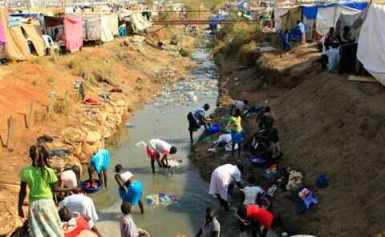S. Sudan advocacy group decries conditions inside UN camps
March 10, 2014 (KAMPALA) – Rally for Peace and Democracy (RPD), an indigenous non-governmental entity in South Sudan has openly decried the worsening conditions in the various United Nation camps sheltering the displaced people.

The organisation mainly attributed the worsening conditions in the camps to what it described as “continued targeted killing” of citizens, while cases of acute food shortage have reportedly persisted thus aggravating the situation.
“Most of IDPs reported that their food security situation in the camps is deteriorating further and that their repeated complaints are falling on deaf ears! It is mid-Summer in South Sudan. Heat rages ominously in Juba, Bor and Malakal, where the greatest count of Internal Displace Peoples,” its statement reads in part.
“Domestic flies, mosquitoes and cockroaches infest the camp dwellings as the rainy season almost approaching. This has driven fear for reason of high morbidity and fatality caseloads of bacterial diseases – bloody and watery diarrhea (dysentery), malaria, typhoid, pneumonia and warm infestations,” it added.
The local entity, in its report, also the daily patient workload, which it says was simply too overwhelming for the few medical personnel serving in the camps. “Sanitary facilities constructed for the IDP camps are not only unsightly, but horribly unhygienic disease traps,” it observed.
Unconfirmed reports also cited some insecurity concern within the UN facilities, with RDP highlighting an incident in which armed government security forces allegedly ransacked the makeshift toilets erected outside the perimeter fence of the IDP camps in Juba.
“This obviously worsened the condition and the over forty thousand displaced persons have to scramble for toilets and bathroom shelters. This sadistic, heartless act of the security forces is evidence that the government wants the IDPs dead at all costs”, the organisation stressed in its report.
Recently, it said, some hard-hearted armed security personnel feeling no restrain, shot randomly inside the camps, killed and wounded the IDPs, further warning of the consequences of “ominous government media propaganda that the IDPs are rebels.”
The organisation, however, urged the United Nations to consider finding a more radical solution toward mitigating the escalating crisis at the IDP camps.
“It [UN] should be borne in mind that on top of the unspeakable sanitary, health and living conditions, the camps are fast becoming insecure and too dangerous, armed conflicts between disgruntled securities,” it noted.
Stephane Dujarric, the new spokesman for the UN Secretary-General told a briefing on Monday about the continued influx of those displaced from Jonglei state into Upper Nile’s Melut county.
“Local officials also highlighted food shortages in the area that are causing tensions with local communities,” Dujarric said in a statement.
Up to 75,000 South Sudanese, according to the UN, are currently being sheltered in eight of its camps within the country, with the numbers expected to rise.
CITIZENS REACT
Meanwhile, several of those displaced told Sudan Tribune they were forced to flee the UN premises due to the ill-treatment from security forces in the country.
Nyakuoth Thuok, a 30-year old mother of five children says she was forced to flee the UN camp in South Sudan due of fear from ethnicity cleansing that erupted in mid-December last year.
“Our lives are always under threat from enemies whenever some of us go out from this camp. So we have decided to stay in this camp for our safety,” she said, adding that most women and children feared to return home due to alleged continued killings in Juba.
Makuil Betiem, another displaced citizen said most women and children were suffering a lot from hunger, despite the small ratios delivered by aids workers.
“Most of us received support from international aids agencies, but a time this assistant does not reach all of us. What is given is not enough for the whole family at a times it takes long for distribution among people which is life threatening,” he confessed.
He also claimed that shootings of those displaced at UN camps was the order of the day, but insisted this was a clear message for those affected to flee.
About 10,000 people have reportedly been killed and nearly a million displaced in the country’s worst-ever violence outbreak since it seceded from Sudan in July 2011.
(ST)
